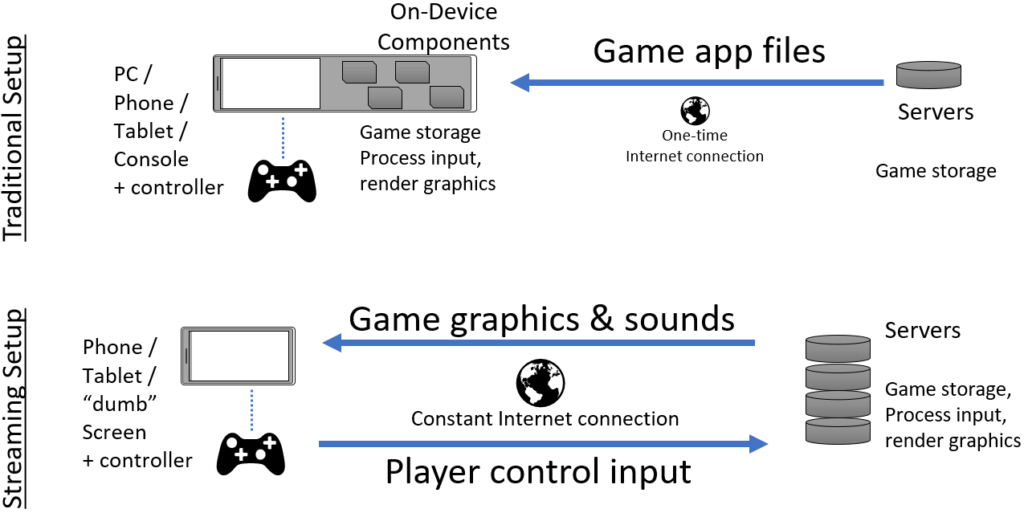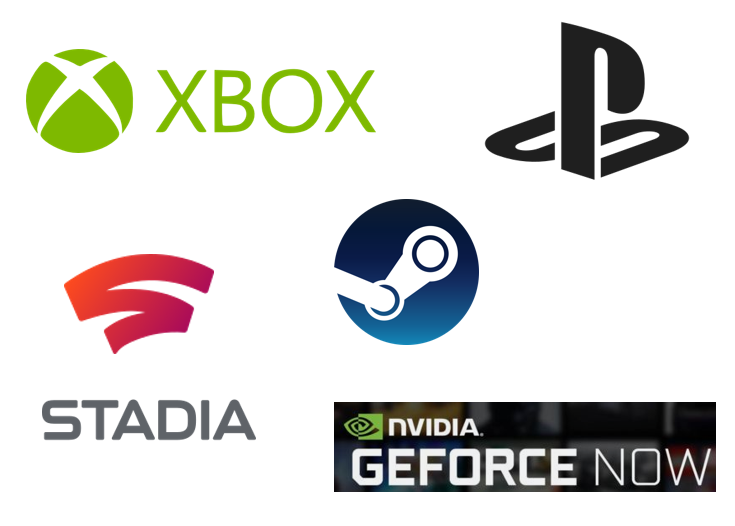A ramble about cloud gaming, Steam and owning your own games.
Cloud gaming is starting to ramp up and next year will really kick off, with many of the major players offering services. The basic idea is that instead of running the game on your device (which might not be powerful enough, or might be battery limited), a company runs the game on a server somewhere else. Via an internet connection you get video and sound, and you send the game controls. Cloud gaming has pros and cons – in a basic summary it has many similarities to other subscription streaming services:
- Players pay a monthly fee to the service instead of buying games
- Players now don’t need to fork out for expensive hardware
- Players must have a lot of internet bandwidth and a low latency connection
There are other concerns*, but my biggest with cloud gaming is: If a service shuts down† then you have no way to play the games you purchased access to, that under traditional methods you would have owned forever.

Steam Link is a service offered by Valve, a company that (use to develop, but now) sells PC games via an online storefront called Steam. They have a launcher program which can download and manage updates, mods and save files for games. Steam Link was an attempt to make a piece of hardware that you could plug in to a TV and have it stream games from a PC to your couch. I never tried this hardware and Valve has since given up on it.

A little while ago Valve introduced a Steam Link app for phones. I’ve been using the android app and this software works really well at streaming from my PC to my phone over my home’s WiFi network. It’s a more usable, and cheaper, alternative to the hardware box that was previously required. And with the more recent Steam Link Anywhere, I can now stream from my PC to anywhere I can get a decent internet connection. Steam Link works by having a mirror of the PC’s desktop & sound, and sending the controls back to the PC. This has upsides in that it is a simple implementation, but downsides in that it requires the PC to be unlocked while in use, which makes for a tricky security proposition if playing remotely.
Where am I going with this train of thought? Valve has reportedly been working on a “cloud gaming” service. Fair play to them if they want a slice of that pie. But I think that Valve would be much better off investing in developing the Steam Link platform.
Valve, since the inception of Steam, has always catered to an audience of PC gamers that have invested a lot in building up not just their game library, but their hardware setups as well. I don’t see this audience suddenly jumping ship and paying subscriptions to cloud gaming services, when they can already play the games they want. Imagine if Valve instead developed their Link software to Stream games from a PC instead of just mirroring the desktop.
Then it would get rid of the current big downsides with Steam Link Anywhere – removing the need to unlock your PC. This would make it appear a lot more attractive than game streaming through a 3rd party service. It wouldn’t solve the issue of networks, and needing high-bandwidth low latency connections between yourself and your home PC, but that is a problem that goes far beyond both Steam Link and cloud gaming services.
Possibly the biggest one-up over cloud gaming services is that a player would be in full control of the library of games. If a company running cloud gaming find they’re not making enough money, they will either raise prices or shut the service down – potentially locking you out of playing your games. That can’t happen with Steam Link as even if it was shuttered, you would still be able to play your games on a desktop back home‡.
Steam is facing real competitors now, a state of affairs which has been a long time coming. But it still holds a leg up over other storefronts in how many features it offers (such as a slew of community features like mods, guides and more). Currently, its biggest strength is how invested existing users are. Instead of just trying to build one more cloud gaming service (though if they have the resources, they should – more competition is always better), leveraging and empowering the existing user base must be a top priority.

I don’t doubt that cloud gaming will be the future way games are consumed for the masses. But just like there are hold-outs who still buy and play vinyl records in the days of music streaming, I see myself being a holdout and wanting full control over my games. I guess I’m just asking to be given that opportunity.
Footnotes
* Other concerns include issues such as how much game developers will end up being paid – and how this will be measured. The music streaming business is still struggling with this.
† Google, one of the prominent upcoming players in game streaming, has quite a history of shutting down projects that it loses interest in.
‡ Legally, Steam is just licensing you access to copies of games, but even this is far more concrete for game ownership than a subscription service which is only licensing you access to streaming.
I take issue with cloud gaming, for the same reasons I take issue with any SaaSS (“Service As A Software-Substitute”), for similar reasons to your listed drawbacks. In short, you are handing over control of your computing to someone else by becoming dependant on them to do your computing for you.
I still have my original CDs and floppy-disks of my favourite games, and can still play them in DOSbox. I still even have some Sinclair ZX Spectrum tapes, which are still playable. I have digitised some using a Sony Walkman, with a guitar amp cable going from the headphone-socket to my PC’s microphone socket, and they play on a Spectrum emulator. Those ancient games have long exceeded their expected lifespan due to physical, local copies existing. Could you reasonably expect a streaming-service from the 1980s or 90s, if one existed, to still exist and honour games that were “bought” on it 30 years previously?
I don’t bother with any game or software that requires “activation”, or where I can’t keep a CD or USB stick as a physical copy. To do otherwise is setting yourself up for disappointment: You already point out the fact that Google has made a somewhat twisted hobby out of starting services then killing them off. If you can’t even trust that something provided by Google will be available tomorrow, then what SaaSS can you trust? When Microsoft killed off their book store, all the titles people had “bought”, even the free ones, ceased to work. In a similar and somewhat ironic turn of events, an accident at Amazon once remotely-deleted all copies of George Orwell’s “1984” from every Swindle device without the “owners” permission or knowledge. Unnecessarily transferring things to “the cloud” is purely a means of controlling users and reducing their freedoms solely for the convenience or profit-margins of developers.
The fact that most die-hard gamers are particularly passionate about their hardware-specs indicates that the need and market for cloud-gaming would be extremely limited. Additionally, a gamer with insufficient money for decent hardware would not be able to afford the monthly fee for a network-connection sufficient for cloud-gaming. This further indicates to me that the very notion of “cloud gaming” is to benefit the publishers at the expense of the players. It’s control and subjugation. To add insult to injury, the publishers must think that their customers are stupid-enough to fall for and agree to such an obvious ploy.
Only now does my rant finally get to the very logistics of cloud gaming (oops!). Historically, if your hardware wasn’t sufficient to run a game, the chances are its main issue was rendering it at a high-enough frame-rate. I don’t know if it has changed recently, but for years, it was the case that an inadequate CPU and graphics-card would still have been inadequate, regardless of whether the game was running remotely or locally. I also struggle to see how you could stream game-data quickly enough over the internet to beat the speed of local-processing on any recent machine, anyway. As I mentioned above, users who can’t afford fast hardware probably can’t afford a fast connection either, so the very idea is fundamentally-flawed.
Cloud-gaming to me seems such a ridiculous idea I can’t understand how it could ever be taken seriously. The way forward is definitely some sort of game-streaming solution where your local copy of the game, running on your PC/console, may stream to your TV/phone/etc over your home-network, as this would be over a LAN rather than a WAN, and is simply an option for the convenience of the user, not a means by which to control them. Something a bit like your description of Steam Link!